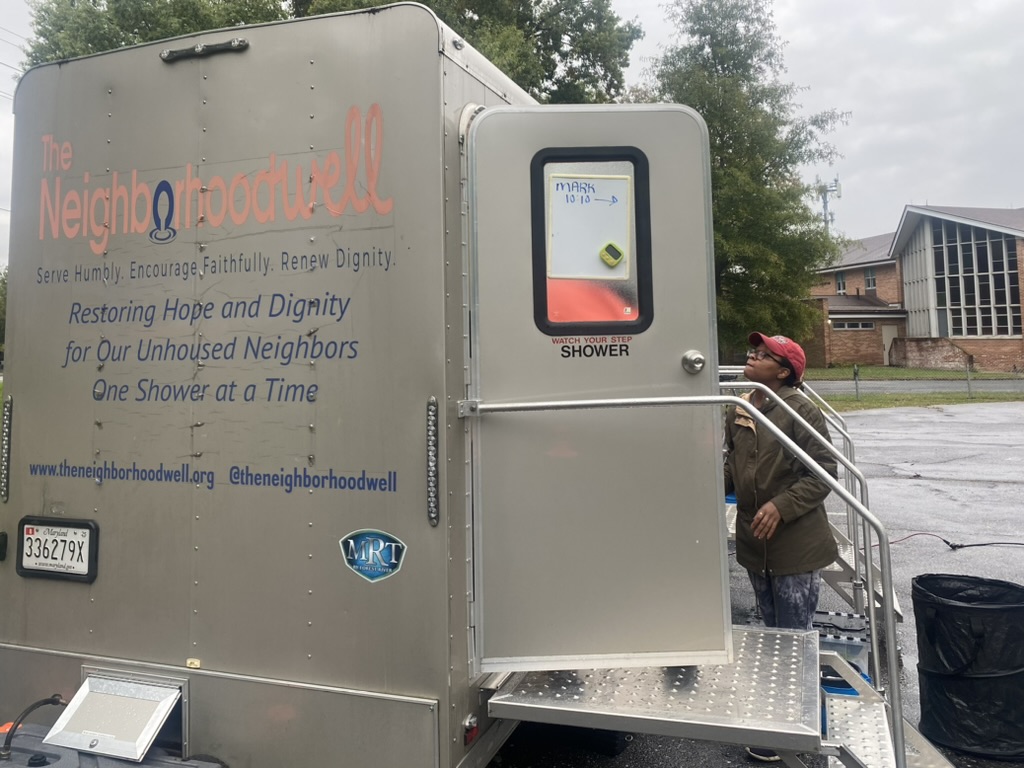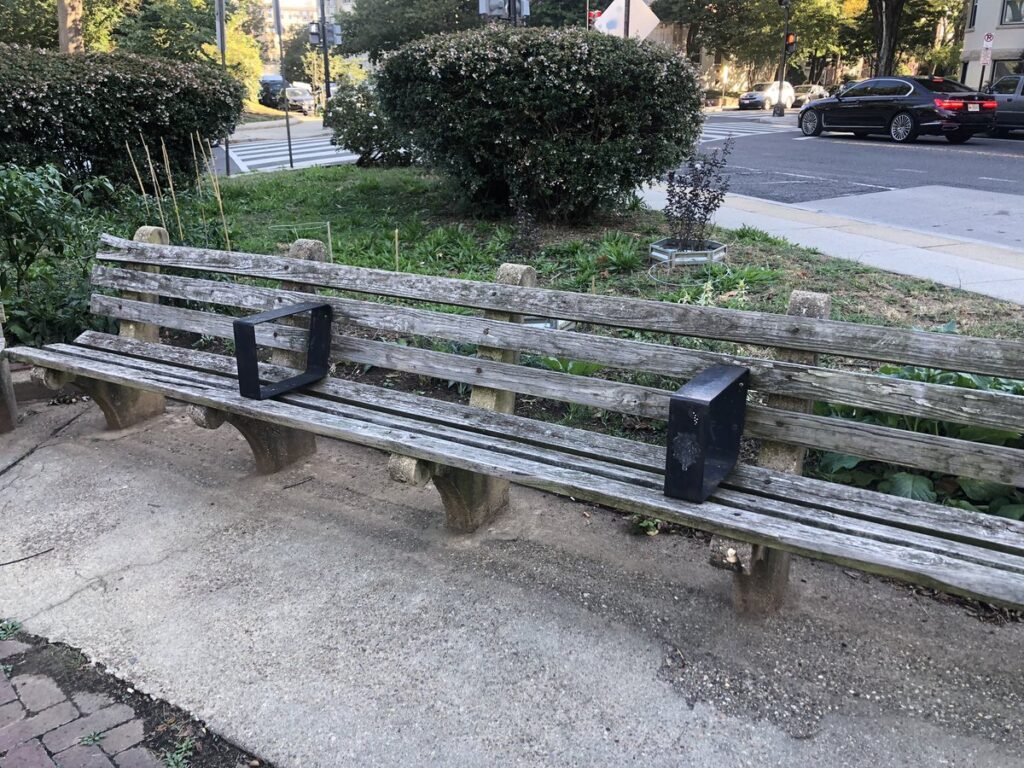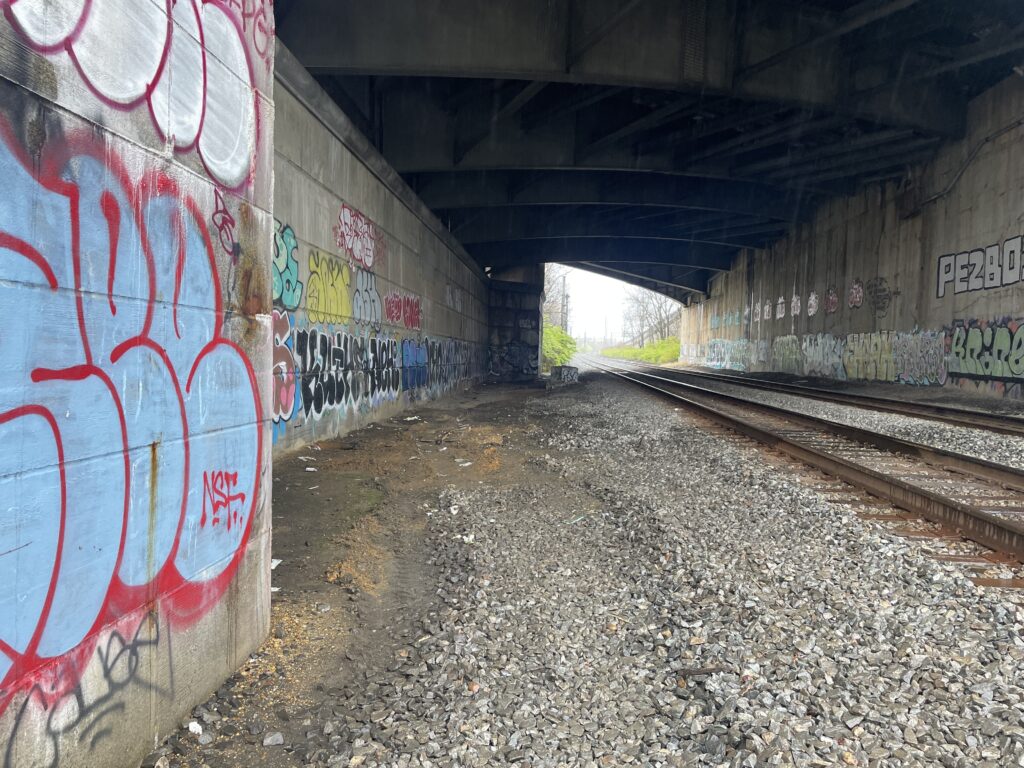Few people take the phrase “follow your dreams” as literally as Omolayo Adebayo.
In 2015, Adebayo had a dream where she saw an unhoused man step out of a mobile shower unit, turn to her and say, “Thank you.” When she woke up, Adebayo knew that she needed to make that dream a reality. And she did.
The Neighborhood Well is a nonprofit offering a private space to shower for those who might struggle to find one, including people who are sleeping outside. For the past two years, Adebayo, Co-founder Jazmin Beverly and a team of volunteers have spent two Saturdays a month offering showers, food, drinks and company to their unhoused neighbors out of the parking lot of the First United Methodist Church in Hyattsville.
The volunteers call the 15 or so unhoused and housing-insecure people they serve their neighbors, believing that better represents how they’d like to interact with the community.
“It’s very fulfilling to see you’re coming out here and meeting a need,” said Adebayo’s cousin, Ibukun Aewakun, who works as a volunteer.
People who sleep outside often lack access to showers. In previous interviews with Street Sense, people who sleep outside said they often didn’t have access to private places to shower, sometimes using gym memberships or public shelter showers to bathe. But gym memberships cost money and shelters can offer only a limited amount of time, space and privacy. It’s estimated 610,000 people in the United States don’t have access to clean sanitation, according to a 2020 article from the American Public Health Association.
The struggle to maintain hygiene has long been connected to poor health outcomes, including infections, skin rashes and worsening chronic health issues like HIV and diabetes. And when people have the opportunity to take care of their hygiene, they’re more willing to reach out to clinics and other health care providers for aid with medical conditions, according to an article from the International Journal of Environmental Research and Public Health. Despite this, funding for public sanitation infrastructure is lacking.
As Street Sense previously reported, people sleeping outside in D.C. often use portable toilets, sometimes with one toilet available for 20 people such as at an encampment near the Watergate building that was closed in 2021. One time, feces piled so high residents could no longer sit down. Advisory Neighborhood Commissioners have submitted resolutions to create mobile showers and better sanitation services, but the city has not implemented them.
Because of the visible need in D.C., Adebayo and Beverly initially intended to begin their work there. They canvassed D.C. and Prince George’s County, speaking to unhoused people in both areas to understand how they could make their services as useful as possible. Through that work, Beverly and Adebayo realized how great the need for showers was, including in their own neighborhoods.
“We decided that it was best to start where home was for us,” Adebayo said.
While Adebayo was involved in community service for years, she was convinced her future lay in being a “big bad attorney in a suit somewhere,” something she felt would preclude her from working in service full-time. While working, Adebayo began creating and distributing “blessing bags” packed with essentials such as hats for the winter, toothbrushes, socks and snacks.
As Adebayo launched her career as an attorney, she had a nagging feeling that God was speaking to her.
“God was like ‘What you’re doing with the blessing bags is good, but I want you to do more,’” Adebayo said. But it wasn’t until the dream that Adebayo knew what “more” would look like, though she did have to Google what a mobile shower was. She’d never heard of them.
The first step was to raise money. Adebayo recalled feeling at a loss as to how to raise the $50,000 to purchase the first shower unit, with two showers, sinks and two flushing toilets. A They raised the money from their community, with a $10,000 grant putting them over the top. Working a full-time job on top of this work is exhausting, but Adebayo said she feels she isn’t alone.
“God is driving the ship,” Adebayo said.
The Neighborhood Well began service in 2021, in the midst of the pandemic. Beverly said she thinks since everyone had to consider washing their hands and social distancing, the importance of hygiene became more evident, boosting support for Neighborhood Well.
“When Covid kicked off, I think it opened people’s eyes to just how difficult hygiene services can be,” Beverly said, “It’s something that I don’t think most people have ever had to think about.”
On a gloomy Saturday in October, most of the volunteers, including Beverly and Abedayo, are dressed in hoodies and raincoats to ward off the cold. Beverly is clutching a Starbucks coffee cup like it’s a lifeline. Adebayo lugs a hose 400 yards to the fire hydrant that serves as the water source for the showers. Still, the mood is decidedly cheerful as the volunteers begin to put up tents.
Adebayo greets all of the guests, who are largely housing insecure or unhoused, by name, and offers them coffee and donuts.
Only two or three guests shower every time Neighborhood Well operates. But 15 to 20 people consistently spend their Saturdays there, Adebayo said. Sitting together under the tent, the neighbors say Neighborhood Well is a social club. Elizabeth Johnson comes every week, though she has never used the shower. To her, it’s somewhere to go to that feels safe and gets her out of the house, something she feels is beneficial to her overall health.
“I keep coming back to meet friends and get treats,” she said.
Cheryl Heir heard about Neighborhood Well through a woman in her building and has been coming consistently ever since. She told Street Sense Neighborhood Well has been a helpful community support since her mother died due to COVID-19. Like Johnson, it gets her out of the house and among friends.
People who used the shower at Neighborhood Well declined to speak to Street Sense, due to privacy concerns.
Since Adebayo and Beverly began operations, they’ve only missed two days of service: September 23, the day of tropical storm Ophelia.
Even though Adebayo and her team couldn’t operate the shower during Ophelia in September, they came to the site and found one of their neighbors waiting for them. He told them he knew they’d be out there so he needed to get up and make sure it was worth it. “Our neighbors are there for us as much as we’re there for them,” said Adebayo.
The first two years of service brought many lessons, including when the team realized that on freezing cold days they couldn’t offer showers, because the hose froze. For that reason, Adebayo says she plans on completely halting winter operations after November.
But Neighborhood Well will still be active. They hope to expand into D.C. and are currently looking a space where they can cultivate the kind of community that makes their work so special. Beverly said they are in discussion with several potential services and hope to be in the city sometime next year.
“We just want to meet people where they are and fill the gap,” she said.








